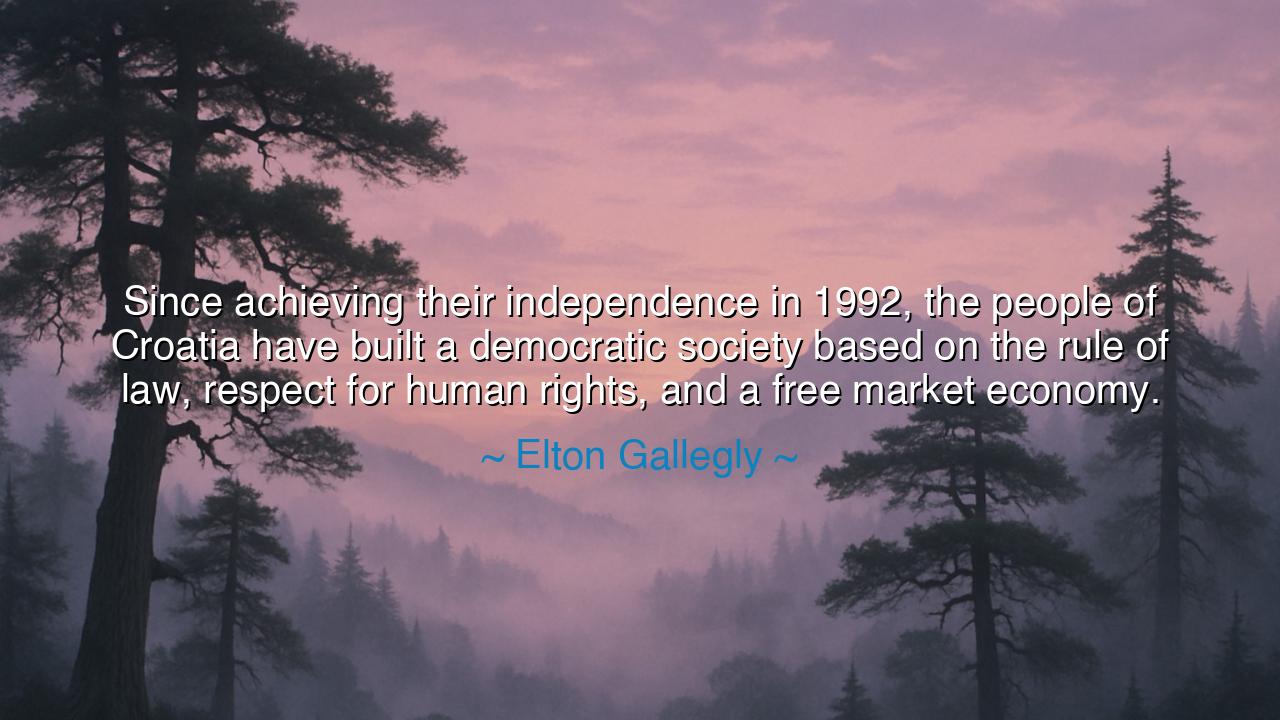
Since achieving their independence in 1992, the people of Croatia
Since achieving their independence in 1992, the people of Croatia have built a democratic society based on the rule of law, respect for human rights, and a free market economy.






“Since achieving their independence in 1992, the people of Croatia have built a democratic society based on the rule of law, respect for human rights, and a free market economy.” — Elton Gallegly
These words of Elton Gallegly stand as both recognition and revelation — a tribute to a nation reborn from the ashes of conflict, and a meditation on the universal spirit of freedom. They are not simply a political statement, but a hymn to endurance, to the indomitable will of a people who refused to surrender their destiny. For in the history of humankind, there is no victory greater than that of a people who rise from oppression to carve their own path upon the earth — not through domination, but through law, justice, and the sacred respect for human rights. In this quote, Gallegly captures the timeless rhythm of civilization itself: that liberty is not given; it is built, and built again, stone by stone, generation by generation.
The meaning of this statement lies not in its political simplicity, but in the profound truth it conceals — that the journey from bondage to freedom is not the end of struggle, but its transformation. Independence is not a moment; it is a lifelong labor. To build a society “based on the rule of law” is to replace chaos with conscience, vengeance with virtue, and fear with fairness. To cherish human rights is to affirm that liberty belongs not to some, but to all. And to establish a free market economy is to give each person the chance to shape their destiny through work, innovation, and will. Thus, Croatia’s story becomes not merely its own, but a reflection of the eternal quest that burns within every people who seek to live in dignity and peace.
The origin of Gallegly’s words can be traced to the turbulent dawn of modern Croatia. In 1992, as the fires of the Yugoslav Wars still burned, the Croatian people stood amid ruin yet refused despair. Their independence was born not in ease, but in anguish — hard-won through blood and sacrifice. Cities like Vukovar, reduced to rubble, became symbols of both suffering and survival. Families who fled their homes returned to rebuild them with trembling hands but unbroken hearts. Out of this crucible came a new republic, determined not to repeat the cycles of hatred that had scarred the Balkans, but to create a nation ruled by law, guided by justice, and open to the world.
Consider the story of Vukovar itself, that martyred city upon the banks of the Danube. In 1991, it was besieged for nearly three months, its people enduring bombardment, hunger, and destruction. When the siege ended, the city lay in ruins, its spirit tested as few in history have been. But in the years that followed, the citizens of Vukovar — Croats, Serbs, Hungarians, and others — began the long work of reconciliation and restoration. Brick by brick, they rebuilt their homes, their schools, their markets, and their trust. Their perseverance stands as living proof of Gallegly’s words — that independence, when rooted in law and humanity, can heal even the deepest wounds.
This rebuilding, both literal and moral, mirrors the eternal law of human progress: that true freedom demands discipline, forgiveness, and vision. A nation cannot live by liberty alone, just as a tree cannot thrive on sunlight without roots. The rule of law anchors justice; respect for human rights nourishes peace; economic freedom empowers the individual to dream. Together, they form the triad upon which every enduring democracy must stand. Croatia’s story, therefore, is not one of victory over others, but of victory over the past — a triumph of order over chaos, reason over revenge, and hope over despair.
Gallegly’s praise also carries a warning whispered through the ages: freedom must be guarded with vigilance. For even the strongest nations can forget the cost of their liberty when comfort dulls memory. Those who once fought for justice must continue to defend it — not with arms, but with integrity. To honor the rule of law, each citizen must live by it; to uphold human rights, each must practice empathy; to sustain a free economy, each must balance ambition with fairness. The torch of independence burns only so long as hands remain willing to carry it.
Thus, let this truth be passed down as wisdom to future generations: freedom is not an inheritance, but a responsibility. It demands not only courage in war but virtue in peace. It is forged in the hearts of those who, even after victory, choose humility over pride, justice over power, and unity over division. Let every nation — and every soul — learn from Croatia’s rebirth that the greatest independence is not merely political, but moral: the freedom to act rightly, to treat others with dignity, and to build a world governed by conscience.
And so, as Elton Gallegly honors Croatia, we too must remember: every people, every person, will face their own moment of independence. Whether it comes after struggle or sorrow, the true test lies not in the breaking of chains, but in what is built once the chains are gone. Let us build, then — wisely, lawfully, and with love — that our freedom may not fade, but flourish, as an offering to those yet to come.






AAdministratorAdministrator
Welcome, honored guests. Please leave a comment, we will respond soon